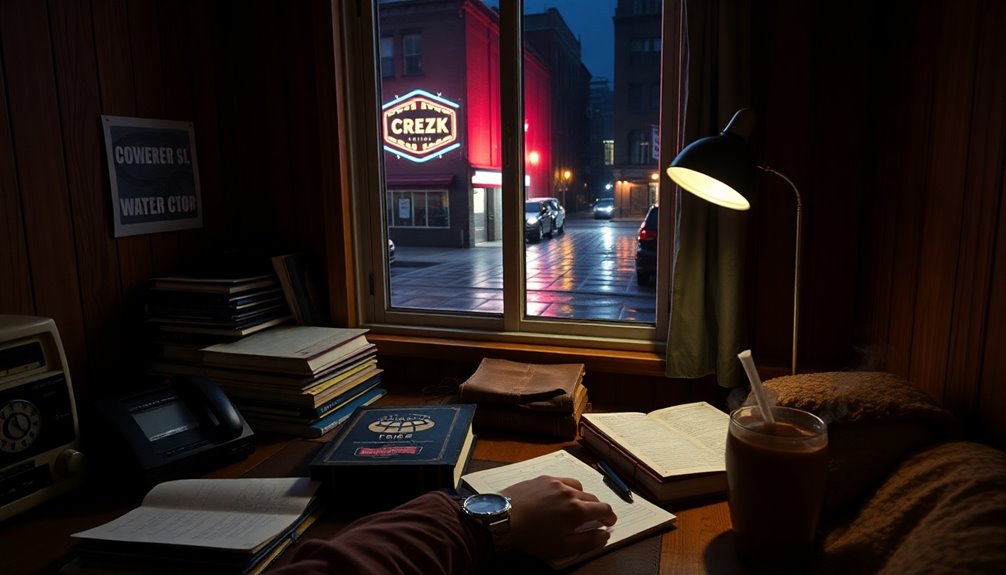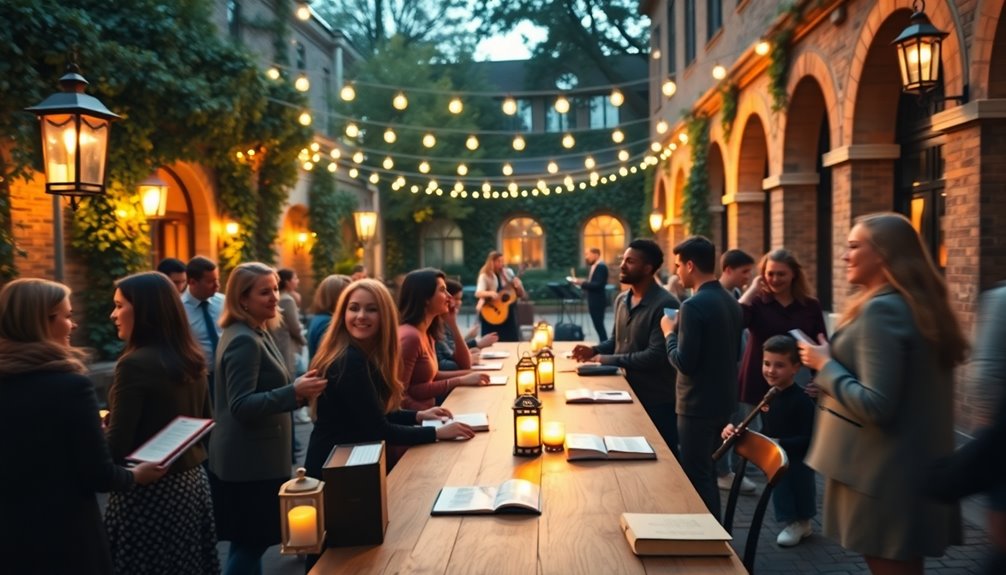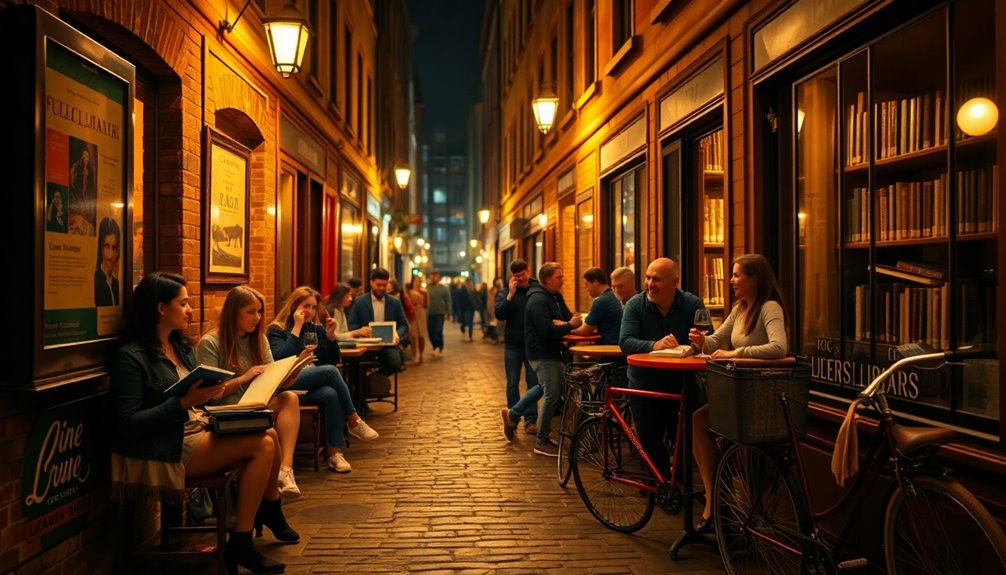
You’ll find that balancing nightlife and study has long been a negotiated practice in student archives, where you move between chalk-streaked lecture halls and smoky taverns to test ideas aloud. Communal housing and clubs turned evenings into informal classrooms, preserving idioms and improvisation through poem nights and debate. You’ll learn to plan backwards from class priorities, map safe routes, and treat socials as low-pressure language labs, and if you keep going you’ll uncover more strategies and histories.
Highlights
- Historical student nightlife blended tavern salons and dormitories as informal classrooms that reinforced language, debate, and cultural learning.
- Communal housing shaped evening routines, creating predictable study windows and shared responsibilities that aided time management.
- University clubs and debate societies historically provided low-pressure spaces for experimental speech and immersive practice.
- Successful balance relied on planning backward from academic priorities, allocating fixed-duration social and study blocks.
- Safety, buffer times, and deliberate reflection on evenings turned nightlife into archival learning without compromising coursework.
Early Student Social Scenes in Ireland’s Learning Hubs
Remember when nights out meant chalk-strewn lecture halls emptying into smoky pubs and earnest debates spilling onto cobbled streets? You trace records of student gatherings in diaries and university minutes, noting how spontaneity shaped scholarly life. Archives reveal networks: study circles, impromptu performances, and informal cultural exchanges that broadened perspectives beyond curricula. You read letters that argue freedom was practiced nightly, learning through conversation as much as lectures. Interpreting these fragments, you see patterns — solidarity, dissent, and creative exchange — that informed academic identity. That legacy teaches you how social spaces once balanced intellectual rigor with imaginative liberty.
Pubs, Poets, and Practice: Language Exchange Through Nightlife
You’ll find that tavern conversation circles acted as informal classrooms where accents, idioms, and local gossip were traded as readily as pints. Poets’ lingual salons preserved and experimented with idiom and meter, turning verse readings into practical lessons in pronunciation and nuance. Evening language drills — from recited couplets to call-and-response chants — kept learning alive after lectures, creating a living archive of student speech.
Tavern Conversation Circles
When you step into a dim pub where poets read between rounds and locals trade idioms over pints, you enter a living archive of spoken language—an informal classroom where mistakes are forgiven and rhythms of everyday speech are learned by ear. You trace tavern traditions in seating, in rounds called aloud, in toasts that map identities. You observe conversation dynamics: repair, mimicry, playful challenge, the passing of nicknames. You collect phrases, test slang, and negotiate meaning without grading. This is practice rooted in history and openness; you learn by joining, by listening, and by choosing when to speak.
Poets’ Lingual Salons
Step into one of these dimly lit salons and you’ll find poets treating language like a shared instrument—turning lines into prompts, inviting listeners to riff, correct, and reinvent speech in real time. You move through archival echoes: marginalia, broadsheets, remembered couplets. Poetic exchanges were social rituals, sites where dialect met diction, and authority loosened. You learn interpretive habits by listening, borrowing rhythms, and challenging syntax with comrades who prize freedom. Creative expression became pedagogy, informal and political, shaping how communities spoke and thought. These salons map a history where nightlife and study cohere, preserving voices that otherwise might vanish.
Evening Language Drills
From the salons’ hush and repartee we move into places where language is louder and more public: pubs, coffeehouses, and late-night study rooms where practice happens between rounds of drink and lines of verse. You trace archival notes and witness how evening drills turned sociable rebellion into pedagogy, where poets swapped couplets and apprentices negotiated idiom. You learn in cramped booths, tasting accents, testing syntax, embracing language immersion as an act of freedom. This interpretive scene shows informal curricula formed by desire and dissent: oral habits codified in memory, dissenting phrases becoming tools, and nocturnal practice reshaping communal tongues.
Evolution of Student Housing and Evening Routines
You’ll notice how communal dormitory life has shaped the rhythms of campus evenings, with shared kitchens and common rooms becoming stages for both conversation and study. Reading archival records and student testimonies shows how evening study rituals—group problem sets, late-night readings, rotating tea rounds—have evolved alongside housing layouts. Interpreting these changes helps explain how living arrangements still structure when and how students balance nightlife and scholarly routines.
Communal Dormitory Life
Although dormitories have always been sites of practicality—shelter, beds, and shared bathrooms—they’ve also been laboratories of social life where evening routines trace broader cultural shifts, from strict curfews and open‑flame study lamps to late‑night streaming marathons and modular study pods. You learn how communal bonding formed rules, rituals, and informal economies—kitchen swaps, laundry rotations—so freedom wasn’t chaos but negotiated order. Archival traces show shifts in governance: student councils, resident advisers, roommate accords. You inherit shared responsibilities that teach autonomy and compromise, and you carry forward practices that balance the impulse to socialize with respect for others’ evenings.
Evening Study Rituals
The rhythms of communal life set the stage for how students shaped their evenings: after kitchens quieted and lights dimmed, people adopted habits that turned private desks and common rooms into intentional study environments. You learn how evening rituals evolved with housing layouts, as residents negotiated silence, lamps, and shared calendars. Archival records show you copying routines, from pipe-lit conservations to compact electric lamps, each shaping study habits and freedoms. You interpret these shifts as choices about time and autonomy: arranging spaces to read, collaborate, or retreat. Those choices mapped social norms, letting you claim focused hours without surrendering communal life.
University Clubs and Night Events That Foster English Skills

Campus clubs and evening events are living archives of language practice where you can test conversational skills, pick up idioms, and get real-time feedback from peers. You explore language immersion through debate societies, improv nights, and multilingual reading groups that archive evolving vernaculars. You attend cultural exchanges and film screenings that contextualize idioms, register shifts, and historical usages. You’ll interpret peers’ corrections, adapting pronunciation and rhythm in situ. These spaces reward experimental speech and creative risk-taking while preserving conversational histories in flyers, recordings, and zines. You leave with practical fluency, personal agency, and a map of communal linguistic resources.
Balancing Late-Night Socializing With Classroom Commitments
When you map your week like a field diary, late-night socials become entries that must be read against class schedules and energy records; treating them as isolated events obscures how evenings reshape your attention, sleep, and memory consolidation. You’ll learn to archive nights—who you met, why you stayed out—and interpret patterns against study schedules and social commitments. That record lets you choose freedom wisely: skip a gathering before a heavy lecture, or accept one when your coursework allows recovery. Over time you’ll craft a rhythm that honors both curiosity and classroom duty, turning nightlife into manageable, meaningful data.
Community Events and Local Festivals as Learning Opportunities
Because local fairs and neighborhood meetups often bundle history, craft, and debate into a single evening, you can treat them as portable field sites where observation and reflection replace passive attendance. You’ll glean context by tracing archival echoes in stalls, oral histories, and program flyers, practicing interpretive reading of symbols and placards. Embrace cultural immersion: sample cuisines, note artisans’ techniques, and link performances to local political rhythms. Festival workshops become micro-labs where you test hypotheses, record anomalies, and converse with custodians of tradition. This method lets you curate knowledge freely, blending nightlife energy with disciplined historical inquiry without losing autonomy.
Practical Safety and Time-Management Tips for Evening Activity
1 practical rule to keep nights productive and safe is to plan backward from your academic priorities: map what you need to accomplish, slot in evening activities as fixed-duration windows, and mark safe routes and check-in points so your movements become part of an interpretive map rather than improvisation. You’ll treat archival habits as guidance: note past evenings that balanced study and social freedom, extract patterns, and apply safety precautions like predictable check-ins and public transit awareness. Be deliberate with time allocation, setting timers and buffer periods so you can explore confidently without eroding study goals, preserving autonomy while minimizing risk.
Leveraging Nighttime Cultural Experiences for Language Practice

Many evenings offer opportunities to practice a language naturally by turning cultural outings into low-pressure immersion labs: notice how menus, signage, and casual conversations use idioms and registers you won’t learn in textbooks, and treat each interaction as data to archive and interpret later. You’ll move through markets, concerts, and cafés collecting phrases, tone, and context; label moments as pronunciation, syntax, or pragmatics. Frame these cultural exchanges as micro-archives to revisit, compare, and annotate. You’ll choose freedom in learning pace, favoring curiosity over perfection, and let language immersion reshape your habits without rigid schedules.
Planning Your Week: Combining Study Schedules With Nightlife Participation
When you map out your week, treat nightlife and study sessions as complementary entries in a living archive: allocate blocks for focused study, note evenings reserved for cultural outings, and record expected learning goals for each so you can compare outcomes later. You’ll sketch a rhythm where study techniques are trialed against real-world encounters, and nightlife strategies become experimental fields. Keep brief annotations about energy, mood, and insights; that archive lets you interpret patterns historically, spotting when freedom-minded choices boosted retention or creativity. Adjust the plan weekly, celebrating discoveries and pruning activities that don’t align with learning goals or personal liberty.
Some Questions Answered
How Did Local Authorities Regulate Student Nightlife Historically?
You were often policed through curfew policies and entertainment restrictions: local authorities set time limits, banned late gatherings, regulated music and venue hours, and required permits for student events. Archival records show officials framed controls as moral and academic upkeep, yet students resisted, claiming personal freedom. Interpretively, these measures balanced public order with social life, revealing tensions between communal governance and youthful desires for autonomy and nocturnal expression.
Did Historical Nightlife Affect Academic Grading Policies?
Yes — you’d often see grading adjust as nightlife swelled, and by coincidence disciplinary records and exam curves lined up. Archival notes show debates linking academic integrity concerns to tougher grading standards when partying rose. You’re shown archival memos, student petitions, and faculty minutes that interpret shifts as both moral panic and policy response. You’ll read evidence that institutions tightened expectations to protect credentials while negotiating students’ freedom and social life.
Were International Students Welcomed Differently at Night Events?
Yes — you’ll find that international students were welcomed differently at night events; archival accounts show varying degrees of cultural acceptance and social integration depending on era and locale. You’ll read interpretive records where some hosts promoted inclusive rhythms, while others limited access or enacted subtle exclusions. You’re invited to read these sources critically, tracing how nightlife served as a site for negotiating belonging, identity, and freedom across changing social landscapes.
How Did Alcohol Laws Shape Language Exchange Venues?
They redirected venues: stricter alcohol regulations pushed language immersion into cafés, community centers and private salons where drinking was limited, while lax laws let pubs become lively exchange hubs. You’ll see archival records showing how permits, age limits and closing hours shaped who gathered, when, and how freely languages mixed. Interpreting these shifts, you’ll grasp how policy created different atmospheres—controlled practice spaces versus rambunctious, alcohol-fueled conversational labs.
What Role Did Technology Play in Modern Nightlife-Study Balance?
Like a lantern guiding and blinding at once, technology reshaped how you juggle nightlife and study. It archived nights into feeds, turned study notes into searchable clouds, and made social media a constant lure. Digital distractions fragmented focus, but tools also let you set boundaries, schedule deep work, and curate communal learning after hours. Interpreting these shifts shows you choose freedom by designing your digital habits and reclaiming nocturnal time.
Summing Everything Up
You’ll tell yourself you came for the lectures, yet your best lessons were scribbled on pub napkins and in midnight festivals — how very academic of you. You’ve archived conversations, mistaken ceilidh steps and borrowed idioms as if they were library books, returning none. It’s ironic: the more you chased quiet study, the richer your grammar grew in laughter and late trains. Keep that misfiled syllabus; it’s your most honest record.
